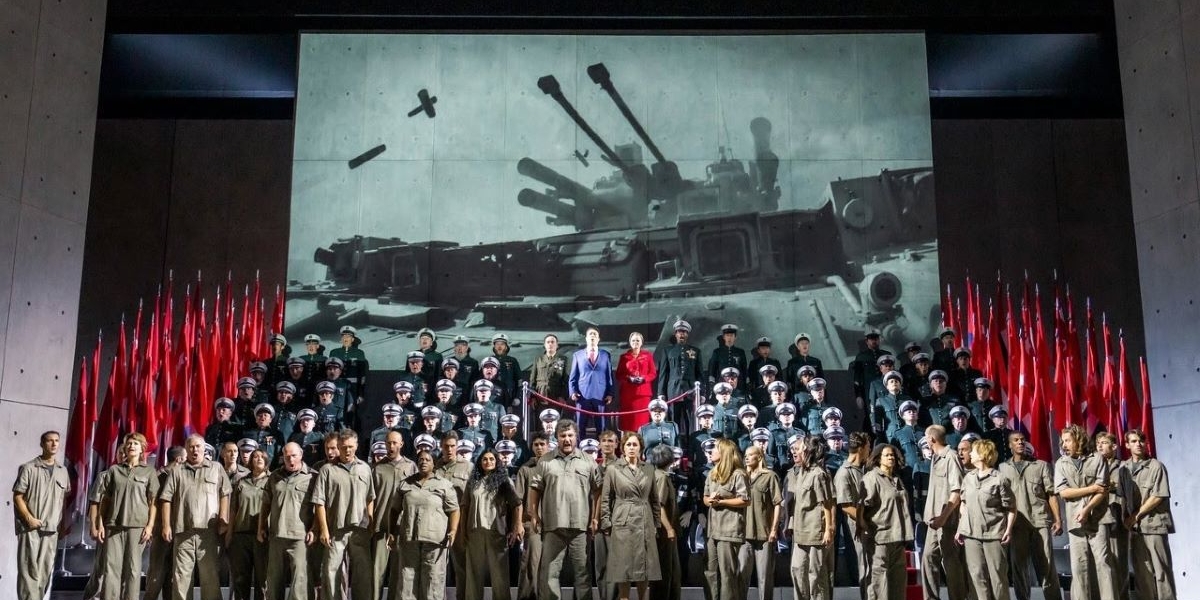Aida was conceived by Verdi as the grandest of grand opera for Cairo in 1871 as a great spectacle. It is intrinsically Egyptian with pyramids temples and Nile scenes. Therein lies the magic.
I am a traditionalist and this is how I would prefer to see Aida. I saw this premiere a few months ago and did not enjoy it but this time I set aside my prejudices and changed my mind. Robert Carsen’s stark production offers an alternative take on war, replacing splendour by chilling reality, more relevant today. Modern replaces ancient warfare.
The down side: Egypt is replaced by concrete bunkers in a military dictatorship. Delicately feminine dances are traded for marching soldiers; Amneris’s Act II, ‘dance of Moorish slaves’ is reduced to women laying a big table with military precision.
Italian words are mistranslated to suit the production. ‘Possente Ftha’ is translated as ‘Powerful God’. Radames’ ‘Sacred Weapon is an AK47. Priests and priestesses are replaced by military; High Priest Ramfis is senior military. Egyptian references remain in the translation, although the setting is in a dictatorship state.
The final scene, when Radames is sentenced to die buried in an underground tomb, and Aida dies there with him, whilst Amneris is distraught above, is a missile silo with enough air to keep the couple going for months, and weapons to blast their way out. Amneris cannot mourn above; she is forced to sing offstage, removing the love triangle dramatic ending.
The upside: Despite problems with the original text, which cannot be altered, Verdi’s phenomenal technicolour music blasts away the khaki and grey. Aida has wonderful solo and chorus numbers and is one of the few scores Verdi wrote with a lead mezzo-soprano (Amneris), (Eboli in Don Carlo and Azucena in Il Trovatore are the others). Verdi’s use of psychology in the two big duets Amneris/Aida and Aida/Amonasro is inspired, foreshadowing Iago/Otello a few years later. ‘Nume, custodi e vindici’ is one of Verdi’s most powerful choruses
The only ‘dance’, if you can call it that, is in the Act II Triumphal March, transformed into a Korean-style military parade, with athletic leaping commandos. Flag covered coffins fill the stage replacing the customary spoils of war. We see war film projections of planes dropping bombs, warships, troops and submarines. This update works. War is ugly, after all.
Verdi, himself quite revolutionary, intentionally composed music with a political message (his ‘oppressed people’ choruses, for example Nabucco and Macbeth). He would be thrilled that his 153-year-old composition still sends a powerful message. in this updated version of war/conflict/love, despite the anachronisms. The personal conflicts are the same.
British Conductor Sir Mark Elder coaxed every subtlety out of the orchestra and chorus; he is a treat, whatever he conducts.
The five soloists are superb.
Latvian mezzo, Elena Garanĉa’s Amneris stole the show with superb singing and acting. Amneris was so credible she was almost the heroine. She truly loves Radames, doing everything to save him. I have never felt sorry for Amneris before.
American soprano, Angel Blue’s Aida was beautifully sung, soaring above the large ensembles, although she did oddly mope about in a raincoat most of the time.
South Korean tenor, Seokjong Baek coped admirably with the tricky role of Radames. Tricky because the tenor launches into ‘Celeste Aida’ on the third page of the score with no warm up; the final phrase ‘un trono vicino al sol’ ranges from pppp to pp on the final ‘sol’ on a top Bb fil di voce morendo ie as quietly as you can possibly sing on the thread of the voice and dying to nothing. This is terrifying for any tenor; Baek did well, though it didn’t quite work.
Both Blue’s and Baek’s acting skills need improvement; there was little chemistry.
French baritone, Ludovic Tézier as Amonasro is in fine commanding form. Lovely voice, good acting, great breath control, and perfect Italian; I understood every word. His Act II confrontation with Aida was powerfully, giving poor Aida no choice as to whether to betray her country or Radames.
American bass, Solomon Howard, in his debut ROH as Ramfis, has a large generous voice. He will be back as Fafner next September.
If you pine for the Egyptian spectacle it is performed annually in Verona.

